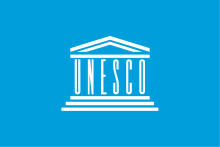Atlas of the World's Languages in Danger: Difference between revisions
revert - this is not relevant to the topic and the sources does not support the caim about some linguists - darwin was not a linguist and did not criticise UNESCOS redbook |
I have omitted the reference to Charles Darwin, however criticism of UNESCOS must be included in the article. |
||
| Line 12: | Line 12: | ||
==Last updates== |
==Last updates== |
||
In February 2009, UNESCO launched online an edition<ref>{{cite web|work=new edition of the Atlas of endangered languages|url=http://www.unesco.org/culture/ich/index.php?lg=EN&pg=00136|title=Safeguarding endangered languages|publisher=UNESCO|accessdate=11 April 2009|date=2009}}</ref> of the Atlas of endangered languages which covers the whole world, contains much more information than previous printed editions and offers the possibility to users to provide online feedback, in view of its constant updating. |
In February 2009, UNESCO launched online an edition<ref>{{cite web|work=new edition of the Atlas of endangered languages|url=http://www.unesco.org/culture/ich/index.php?lg=EN&pg=00136|title=Safeguarding endangered languages|publisher=UNESCO|accessdate=11 April 2009|date=2009}}</ref> of the Atlas of endangered languages which covers the whole world, contains much more information than previous printed editions and offers the possibility to users to provide online feedback, in view of its constant updating. |
||
==Criticism== |
|||
Not all linguists agree that 'endangered' languages should be preserved, instead suggesting that a single 'world language' would be more beneficial to mankind<ref>http://www.worldpoliticsreview.com/articles/6176/u-s-should-prioritize-english-language-promotion</ref>. |
|||
==See also== |
==See also== |
||
Revision as of 20:45, 13 August 2010

The Red Book of Endangered Languages was published by UNESCO and collected a comprehensive list of the world's languages currently facing extinction. It has been replaced by the UNESCO Atlas of the World's Languages in Danger.
History
In 1992 the International Congress of Linguists (CIPL) meeting in Quebec discussed the topic of endangered languages, as a result of which it formed the Endangered Languages Committee. It held an international meeting also in 1992 in Paris to place the topic before the world and initiate action. The meeting was considered important enough to come under the authority of UNESCO.
At the instigation of Stephen Wurm the committee resolved to create a research center, the International Clearing House for Endangered Languages (ICHEL) and to publish the UNESCO Red Book of Endangered Languages based on the data it collected. Shigeru Tsuchida was to start the research center. It began in 1994 at the University of Tokyo with Tasaka Tsunoda as its director.
Meanwhile the initial reports on endangered languages had already been collected and submitted to UNESCO by regional experts in 1993. These were now turned over to ICHEL, which created a website (given under "External links") for the red book. It continues to be updated regularly.[1]
Last updates
In February 2009, UNESCO launched online an edition[2] of the Atlas of endangered languages which covers the whole world, contains much more information than previous printed editions and offers the possibility to users to provide online feedback, in view of its constant updating.
Criticism
Not all linguists agree that 'endangered' languages should be preserved, instead suggesting that a single 'world language' would be more beneficial to mankind[3].
See also
References
- ^ Brenzinger, Matthias (2007). Language diversity endangered. Berlin, New York: Mouton de Gruyter. pp. 206–207. ISBN 3110170493, 9783110170498.
- ^ "Safeguarding endangered languages". new edition of the Atlas of endangered languages. UNESCO. 2009. Retrieved 11 April 2009.
- ^ http://www.worldpoliticsreview.com/articles/6176/u-s-should-prioritize-english-language-promotion
External links
- "UNESCO Red Book of Endangered Languages". UNESCO. 2003. Retrieved 11 April 2009.
{{cite web}}: Unknown parameter|languages=ignored (help) - "Endangered Languages". Intangible Cultural Heritage. UNESCO. 2009. Retrieved 11 April 2009.
